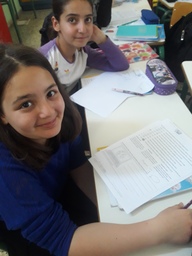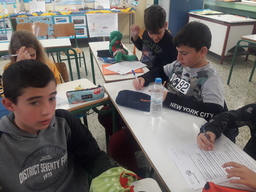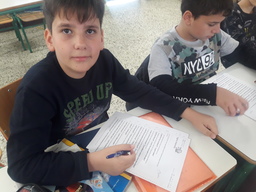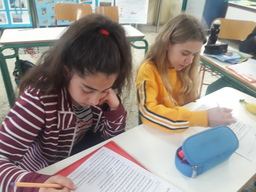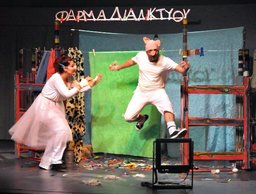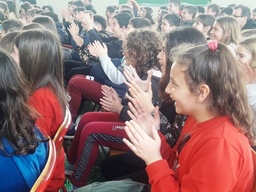Educational Programmes
Internet addiction Workshop
Working on the theme of keeping our children safe against the new technology temptations we organized three educational workshops in the 4th, 5th and 6th grades with the help of the psychologist of our school.
The procedure followed was:
During the workshops we also visited the educational website : "Safer Internet for kids " with our pupils playing safe games, doing crosswords and quizes, watching educational videos all relevant to the internet safety rules.

Τhe questionnaire forms are attached below.
The procedure followed was:
- video presentation on internet addiction as it appears in young ages
- discussion on the symptoms and consequences of addiction on the social life and psychology of children-adolescents.
- meditation-recognition of the problem by pupils-discussion about personal experiences from their daily routine
- questionnaires were handed out to pupils where they were asked to answer questions about their online habits, how safe the pages they visit are, how much time they spend on playing online game and a lot more as you can see in the attached file.
- Conclusions: spending a lot of time on the internet can lead children to addiction resulting in low school performance , anger, arguments with parents, alienation from friends and social activities. Most primary school pupils spend 1-2 hours on the net on a daily basis but there is also a considerable number of kids who play games online even for 14 hours! The reasons for that is the lack of interests and attractive activities-actually they find internet games much more attractive as they said! -and the lack of time limits among others.
- Suggestions made by the pupils themselves: time limits by parents, spending more valuable time on outdoor activities and games with friends-a healthy social life!
During the workshops we also visited the educational website : "Safer Internet for kids " with our pupils playing safe games, doing crosswords and quizes, watching educational videos all relevant to the internet safety rules.

Τhe questionnaire forms are attached below.
Liitteet:
Pupils working on the questionnaires
Internet Addiction Educational Programme
We all know that addiction to the use of the internet is an unpleasant reality for children and adolescents, causing in many cases serious mental health problems.
The University of Athens implemented the ARIADNE programme, according to which Mental Health Professionals have received special training on the adolescent addiction to the Internet.
One of these scientists visited our school on Friday 19/4/2019 and talked to the 4th, 5th and 6th grade students.
He presented the positive and negative aspects of using the internet, pointing out how easy it is for a child to get addicted to using all these new smart devices. He explained to them the traps that certain online games hide, even putting their life in danger.
The children submitted very interesting questions as they had been prepared by their teachers, by completing questionnaires both in English and Greek.
The conclusions, many and interesting: but mostly we found out that today's children, although familiar with the social media, are not aware of the serious dangers they face being internet users for so many hours during the day.
We only hope that educational programmes like this will give food for thought to all of us, students and teachers.
The University of Athens implemented the ARIADNE programme, according to which Mental Health Professionals have received special training on the adolescent addiction to the Internet.
One of these scientists visited our school on Friday 19/4/2019 and talked to the 4th, 5th and 6th grade students.
He presented the positive and negative aspects of using the internet, pointing out how easy it is for a child to get addicted to using all these new smart devices. He explained to them the traps that certain online games hide, even putting their life in danger.
The children submitted very interesting questions as they had been prepared by their teachers, by completing questionnaires both in English and Greek.
The conclusions, many and interesting: but mostly we found out that today's children, although familiar with the social media, are not aware of the serious dangers they face being internet users for so many hours during the day.
We only hope that educational programmes like this will give food for thought to all of us, students and teachers.
Pictures from the workshop
"The Internet Farm"
A few days ago our students had the opportunity to attend the awarded educational performance "The Internet Farm" .
The performance was presented by the theatrical group "Hiliodentri" in an interactive and stimulating way while showing the children how to protect themselves from the internet traps.
It is important for our children to remain safe without being deprived of the journey to the knowledge that online tour offers.
It is worth mentioning that "The Internet Farm" educational performance, in collaboration with the Greek Safer Internet Center - Saferinternet.gr has been distinguished on a European level as one of the most inspiring practices that help children discover basic Internet safety rules. It was included as the only project from Greece in the special European edition of the Evens Foundation for Digital Literacy in Europe.

